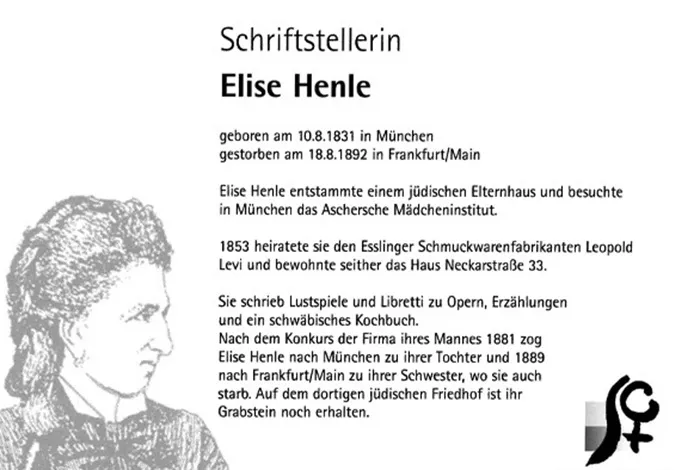Elise Henle, a notable 19th-century German poet, dramatist, and writer, made significant contributions to German literature through her diverse body of work, which includes poetry, dramatic comedies, opera libretti, and cookbooks. Her literary endeavors reflect the cultural and social dynamics of 19th-century Germany and offer a unique perspective on the role of women in German poetry during that era.
Early Life and Background
Born on August 10, 1832, in Munich, Bavaria, Elise (Sara) Henle was the fifth of six children in a wealthy Jewish family. Her father, Benedict (Baruch) Henle, was known for his geographical and horological reference books, while her mother, Therese, was the sister of poet Henriette Ottenheimer. This familial connection to literature and scholarship undoubtedly influenced Henle’s literary pursuits. She received her education at the Aschersche Mädcheninstitut, a boarding school for girls in Munich, where she began writing her first pieces, ranging from comedies to dramas and opera librettos.
Literary Career and Works
Henle’s literary career was marked by versatility and engagement with contemporary issues. Her first published work, the satirical poem Hut ab! (1867), was written in response to an anti-Semitic statement by a judicial officer, showcasing her willingness to confront societal prejudices through literature. This was followed by works such as Beim Volksfest (1869), Das Zweite Jägerbataillon (1869), and Die Wacht am Rhein (1870), which further established her presence in the literary scene.
Henle also ventured into drama and opera, achieving success with the political comedy Der Zweite September and the libretto for Richard Kleinmichel’s romantic-comic opera Manon, oder Schloß de l’Orme, based on Abbé Prévost’s Histoire du Chevalier des Grieux et de Manon Lescaut. Her comedies, including Durch die Intendanz, Die Wiener in Stuttgart, Aus Göthes lustigen Tagen, Der Erbonkel, and Liebesqualen, were well-received in German and Austrian theaters, reflecting her adeptness at capturing the nuances of contemporary society.
Comparison with Contemporaries
In the landscape of 19th-century German poetry, Henle’s work stands alongside that of her contemporaries, such as Heinrich Heine and Annette von Droste-Hülshoff. Heine, known for his lyric poetry and prose, often infused his work with political and social commentary, much like Henle’s satirical and comedic pieces. Von Droste-Hülshoff, one of the few prominent female poets of the time, explored themes of nature, religion, and individuality, paralleling Henle’s own explorations of societal norms and cultural identity. While Henle may not have achieved the same level of fame as these poets, her contributions reflect a similar engagement with the cultural currents of her time.
Cultural and Social Impact
Henle’s work offers insight into the experiences of Jewish women in 19th-century Germany. Her writings address themes of identity, assimilation, and the challenges faced by Jewish communities during a period marked by both enlightenment and anti-Semitism. By incorporating these themes into her literature, Henle provided a voice to underrepresented perspectives in German poetry and drama.
Conclusion
After her husband’s business faced financial difficulties in 1881, Henle moved to Munich to live with her daughter and later relocated to Frankfurt am Main to reside with her widowed sister. She continued to write, publishing two popular Swabian German cookbooks in verse: Guat is’s (1888) and So mag i’s (1892). These works not only demonstrate her literary versatility but also her commitment to preserving and celebrating regional culture. Henle passed away on August 18, 1892, in Frankfurt am Main and was buried in the Frankfurt Jewish Cemetery.
Elise Henle’s contributions to 19th-century German poetry and literature reflect a dynamic engagement with the cultural and social issues of her time. Her diverse body of work, spanning poetry, drama, opera, and culinary literature, underscores her multifaceted talent and her role as a significant, though often overlooked, figure in German literary history.

